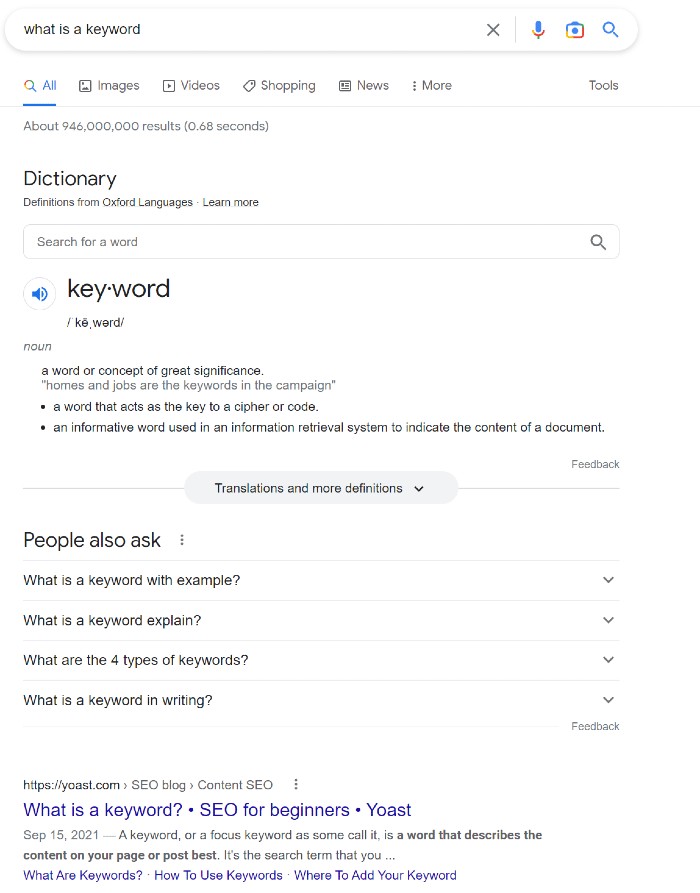The foundation of your SEO strategy is keyword research. Why? Read on to learn why keyword research is important to grow your online presence.
Why Keyword Research is Important
You don’t have to be into digital marketing or even blogging full time to have heard the term keyword research. In fact, any business owner who has spent any amount of time researching how to get their website, products or services found online has run across this term.
Keyword research is one of the most important factors that sets the stage for getting results from SEO work.
Why is that?
Well, it helps to understand what exactly keyword research is.
Let’s start with an in depth look at what a keyword is and the types of keywords available so you know how keyword research works.
Hopefully this will give you more insight into why keyword research is important for SEO.

What is Keyword Research?
Simply put, keyword research is the process of researching terms (or related terms) people type into search engines like Google to find information, products or services.
Once you’ve decided on meaningful and relevant keywords for a selected topic or page, you use them strategically in your content so that it appears higher on the search engine results page (SERP).
But deciding on these keywords relies on more comprehensive research than simply choosing a term (or a few) because these days SEO is highly competitive. So you have to choose keywords you have a chance to rank for. This means researching search volume, competitiveness and other fine details to make selections.
So, let’s discuss a few details about keywords themselves. But let’s not overwhelm you with the details of how to do keyword research. We’ll save that for another time.
What is a Keyword?
Digital marketers and SEO professionals define a keyword as a single word or phrase (group of words) people type into a search engine to find information about a product, service or topic.
Keywords are important in SEO as they define content that a searcher is in the market for.
If you typed “what is a keyword” into Google Search, for example your search is the keyword (a group of words in this instance). As a question, this indicates you’re looking for informative content and generally search engine results pages (SERPs) will show this type of content on the first page of the results.

But that’s not all you need to know about keywords!
3 Types of Keywords
Short-tail keywords
These keywords are generic, popular, broad and offer lots of search traffic. Short-tail keywords are one or two words but are very competitive (read: very difficult to rank for).
Examples:
- Running shoes
- Botox
- SEO services
Middle Tail
Mid-tail keywords will have more words than short-tail and fewer than long-tail keywords. Obvious, right? The thing about mid-tail keywords is that they’re a little more specific and will be less difficult to rank for in some cases.
We say “in some cases because, as everything goes in SEO, “it depends” on competitiveness of the niche – who’s writing and ranking, etc.
Examples:
- Senior Center Connecticut
- SEO services NYC
- Black running shoes
Long Tail
Long-tail keywords are much longer, can often be less difficult to rank for and may have lower competition. Additionally, these terms become very specific. Although these types of terms have limited search traffic, they’re useful for targeting a specific audience or topic and can be excellent for:
Examples:
- “Why keyword research is important in SEO”
- “What type of therapist can prescribe medication”
- “Can you be anorexic and not be underweight”
Keyword Intent
We’re not done yet!
Understanding a bit about the length of keywords can make the difference in your marketing efforts, but more important to SEO is the keyword intent!
Having an understanding of search intent (or keyword intent) is likely the most important aspect of getting your SEO right!
Common types of search intent include (but are not limited to):
- Informational – these are terms people search when they want information (Example: “why keyword research is important in SEO”)
- Navigational – these are terms usually used by searchers who want to visit a specific site or page on your site (Examples: “GYBO Digital Marketing” or “GYBO SEO Services”, etc)
- Transactional – this type of search term is specific toward a searcher’s intent to buy. These searches indicate the search knows exactly what they want to buy. (Examples: “best price on white walking shoes”, “organic olive oil coupon code”, etc)
Why is this all relevant?
Let’s discuss…
Why Keyword Research is So Important
Keyword research is the foundation of your entire SEO strategy! Get this wrong and you sacrifice the quality and quantity of visitors to your website. This mistake will also cost you the most important results any business is looking for … an increase in leads and revenue.
1. Understanding Your Business
Keyword research helps you to be clear about your brand, your business and your products or services.
2. Understand the Competition
Keyword research provides clarity on the competitive landscape including who your competitors are, what they rank for and your own ability to rank.
3. Define Your Content Strategy
If a user searches for “how to change oil in a 2022 Subaru Crosstrek” but they land on a product page for your oil filter (a transactional page), they’re not going to be satisfied with the result.
As we mentioned previously, knowing the types of keywords and the search intent can help you make decisions about the type of content your pages should deliver.
4. Find New Keywords
Sounds obvious, right? But, it’s not uncommon for many business owners to utilize industry jargon that their customers rarely look for. Doing keyword research is important to know what search terms your audience actually uses!
Additionally, keyword research makes it possible to find similar and related keywords that sometimes you don’t even think of.
5. Improve Ranking Ability
Ranking isn’t the most important objective in an SEO strategy, but ranking for the right keywords makes the difference between relevant and irrelevant visitors, thereby determining the performance of the website in generating leads and revenue.
Keyword research tells us which page of the website targets specific keywords which, in turn, provides Google a clear picture of what each page is about to help you rank.
How Do You Get Started?
It’s possible to do keyword research and SEO on your own, but can become a daunting task when you don’t have a dedicated digital marketing specialist.
If you want to grow your business presence online through the use of SEO, we recommend hiring a digital marketing agency for ongoing SEO services.
The expert team at GYBO starts every campaign with in-depth keyword research and takes a strategic approach to your SEO which can help you rank and see results sooner than learning and experimenting over time.
Contact GYBO

Passionate digital marketing expert with over 10 years of experience. Broad, hands-on marketing skillset, from web developer, SEO, PPC, Data Analytics & Tracking.
